The International Agency for Research of Cancer (IARC), the cancer agency of the World Health Organisation (WHO), has assessed that consumption of red meat and processed meat, tends to cause cancer.
At a formal gathering of a Working Group of 22 experts from 10 different countries, the IARC Monographs Programme classified that consumption of red meat, (beef, veal, pork, lamb, mutton, horse and goat) is a probable cause of cancer to humans. There were limited but strong mechanistic evidences of it. This association mainly observed cancer near rectum area or colorectal cancer. However associations were also seen for pancreatic cancer and prostrate cancer.

Processed meat (meaning meat that has been transformed through salting, curing, fermentation, smoking,or other processes to enhance flavour or improve preservation) was confidently classified as carcinogenic to humans, since there was sufficient evidence to support the statement. Consumption of meat varies from one country to another. The experts have concluded that if 50 gram portion of processed meat is consumed on a daily basis, it increases the risk of colorectal cancer by 18%.
“For an individual, the risk of developing colorectal cancer because of their consumption of processed meat remains small, but this risk increases with the amount of meat consumed. In view of the large number of people who consume processed meat, the global impact on cancer incidence is of public health importance,” said Kurt Straif, Head of the IARC Monographs Programme.

The IARC conducted more than 800 studies to investigate dozen types of cancer with the consumption of red meat and processed meat in various countries and population with diverse diets.
“These findings further support current public health recommendations to limit intake of meat. At the same time, red meat has nutritional value. Therefore, these results are important in enabling governments and international regulatory agencies to conduct risk assessments, in order to balance the risks and benefits of eating red meat and processed meat and to provide the best possible dietary recommendations,” said Christopher Wild, Director of IARC .

















